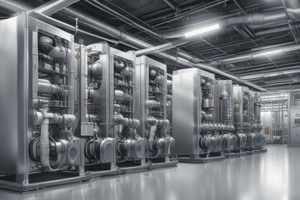Podcast
Questions and Answers
What is the primary function of the compressor in a refrigeration system?
What is the primary function of the compressor in a refrigeration system?
Which component of the refrigeration system is responsible for reducing the pressure of the refrigerant?
Which component of the refrigeration system is responsible for reducing the pressure of the refrigerant?
What type of protective gear is essential for preventing injury while operating a refrigeration system?
What type of protective gear is essential for preventing injury while operating a refrigeration system?
How should refrigerant leaks be detected in a refrigeration system?
How should refrigerant leaks be detected in a refrigeration system?
Signup and view all the answers
What maintenance practice is critical for ensuring energy efficiency in refrigeration systems?
What maintenance practice is critical for ensuring energy efficiency in refrigeration systems?
Signup and view all the answers
Which method is effective in minimizing heat gain and loss in a refrigeration system?
Which method is effective in minimizing heat gain and loss in a refrigeration system?
Signup and view all the answers
Which refrigerant type is NOT considered a natural refrigerant?
Which refrigerant type is NOT considered a natural refrigerant?
Signup and view all the answers
Why is it essential for refrigeration operators to undergo proper training?
Why is it essential for refrigeration operators to undergo proper training?
Signup and view all the answers
What is a benefit of using variable speed drives in refrigeration systems?
What is a benefit of using variable speed drives in refrigeration systems?
Signup and view all the answers
What is the purpose of the evaporator in a refrigeration system?
What is the purpose of the evaporator in a refrigeration system?
Signup and view all the answers
Study Notes
Refrigeration Operator Study Notes
System Components
-
Compressor:
- Pumps refrigerant through the system.
- Increases pressure and temperature of refrigerant gas.
-
Condenser:
- Releases heat from the refrigerant.
- Converts refrigerant gas into liquid.
-
Expansion Valve:
- Reduces pressure of the refrigerant.
- Allows refrigerant to expand and cool before entering the evaporator.
-
Evaporator:
- Absorbs heat from the environment.
- Converts liquid refrigerant back into gas, cooling the surrounding space.
-
Refrigerant:
- The fluid that circulates through the system.
- Common types include R-134a, R-404A, and natural refrigerants like ammonia.
Safety Protocols
-
Personal Protective Equipment (PPE):
- Use gloves, goggles, and protective clothing to prevent injury.
-
Leak Detection:
- Regularly check for refrigerant leaks using electronic leak detectors or soap solutions.
-
Ventilation:
- Ensure adequate ventilation in areas with refrigerants to prevent gas accumulation.
-
Emergency Procedures:
- Familiarize with emergency shut-off procedures and evacuation protocols.
-
Training:
- Operators must undergo proper training on handling refrigerants and emergency response.
Energy Efficiency
-
Regular Maintenance:
- Perform routine checks and maintenance to keep systems running efficiently.
-
Insulation:
- Insulate refrigerant lines and storage areas to minimize heat gain and loss.
-
Temperature Settings:
- Set optimal temperature settings for systems to reduce energy consumption.
-
Variable Speed Drives:
- Use variable speed compressors and fans to match cooling load requirements.
-
Energy-Efficient Equipment:
- Invest in high-efficiency compressors and components to reduce energy usage.
-
Monitoring Systems:
- Implement monitoring systems to track energy consumption and system performance.
System Components
-
Compressor:
- Essential for circulating refrigerant; increases gas pressure and temperature.
-
Condenser:
- Responsible for dissipating heat, transforming refrigerant gas into a liquid state.
-
Expansion Valve:
- Lowers pressure of the refrigerant, facilitating its expansion and cooling before reaching the evaporator.
-
Evaporator:
- Absorbs heat from the surroundings, converting liquid refrigerant back into a gas to cool the area.
-
Refrigerant:
- Circulates through the entire system; common refrigerants include R-134a, R-404A, and natural options like ammonia.
Safety Protocols
-
Personal Protective Equipment (PPE):
- Essential gear includes gloves, goggles, and protective clothing to mitigate injury risks.
-
Leak Detection:
- Utilize electronic leak detectors or soap solutions for regular inspections to identify refrigerant leaks.
-
Ventilation:
- Maintain sufficient airflow in refrigerant storage areas to prevent gas accumulation, enhancing safety.
-
Emergency Procedures:
- Operators should be familiar with emergency shut-off protocols and evacuation plans to ensure quick response during incidents.
-
Training:
- Mandatory training for operators focusing on safe refrigerant handling and effective emergency response strategies.
Energy Efficiency
-
Regular Maintenance:
- Conduct routine inspections and maintenance to ensure optimal system performance and efficiency.
-
Insulation:
- Insulate refrigerant lines and storage areas to reduce heat gain and loss, contributing to energy savings.
-
Temperature Settings:
- Optimal temperature configurations help in lowering overall energy consumption rates.
-
Variable Speed Drives:
- Employ variable speed technology for compressors and fans, aligning system operation with cooling load demands.
-
Energy-Efficient Equipment:
- Investing in high-efficiency compressors and components significantly reduces energy use.
-
Monitoring Systems:
- Implement energy monitoring systems to evaluate consumption patterns and overall system performance.
Studying That Suits You
Use AI to generate personalized quizzes and flashcards to suit your learning preferences.
Description
This quiz covers essential components of refrigeration systems, including the functions of the compressor, condenser, expansion valve, and evaporator. Enhance your understanding of how each component contributes to the overall efficiency and effectiveness of refrigeration. Perfect for students and professionals in the refrigeration field.





